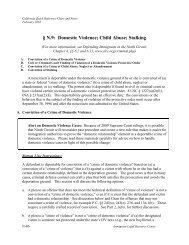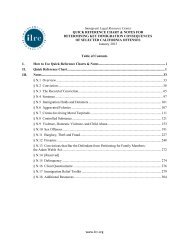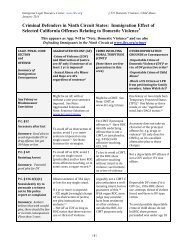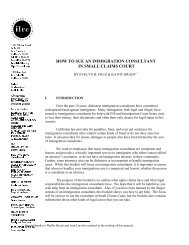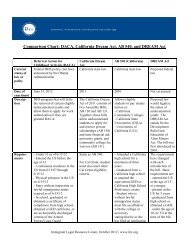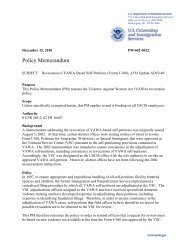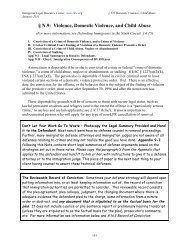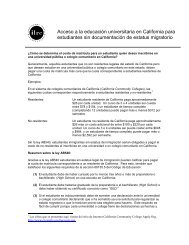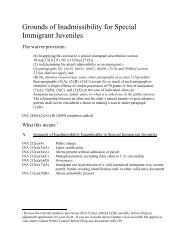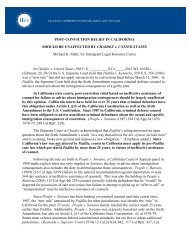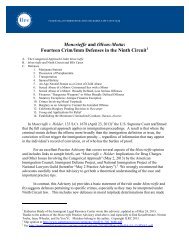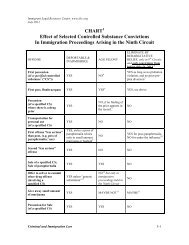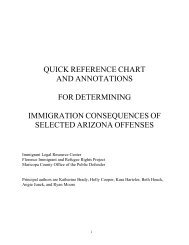quick reference chart and notes for determining immigration - ILRC
quick reference chart and notes for determining immigration - ILRC
quick reference chart and notes for determining immigration - ILRC
Create successful ePaper yourself
Turn your PDF publications into a flip-book with our unique Google optimized e-Paper software.
Cali<strong>for</strong>nia Quick Reference Chart <strong>and</strong> Notes<br />
February 2010<br />
approval of this approach. 169 However, counsel should make every ef<strong>for</strong>t to keep a minor’s age<br />
out of the record of conviction of an age-neutral sex offense. For one thing, this would prevent<br />
the offense from being charged as a deportable “crime of child abuse.”<br />
A non-consensual sex offense may be held a crime of violence. For example, sexual battery<br />
under P.C. § 243.4 is a “crime of violence” as a felony but not necessarily as a misdemeanor. 170<br />
A crime of violence is an aggravated felony if a sentence of a year or more is imposed. Because<br />
a crime of violence becomes an aggravated felony if a sentence of a year or more is imposed,<br />
counsel must bargain <strong>for</strong> a sentence of 364 days or less <strong>for</strong> any one Count. See § N.2 Sentence<br />
Solutions.<br />
Crime involving moral turpitude. Aggressive nonconsensual sexual conduct such as sexual<br />
battery will be held a crime involving moral turpitude, regardless of whether the victim is a<br />
minor.<br />
Crime of child abuse, neglect or ab<strong>and</strong>onment. The BIA held that an age-neutral offense that<br />
involves harm will be a deportable crime of child abuse if the reviewable record of conviction<br />
shows that the victim was under age 18. Matter of Velazquez, supra. For this reason counsel<br />
should ensure that in<strong>for</strong>mation in the record of conviction does not indicate that the victim was<br />
under 18. However, <strong>immigration</strong> counsel will argue that this holding should be considered<br />
overturned.<br />
Conviction of an offense involving negligent or reckless public behavior, such as P.C. §<br />
647(a), lewd conduct in public in disregard of possible witnesses, ought not to have <strong>immigration</strong><br />
consequences. Older cases held that it is a crime involving moral turpitude, but can hopefully<br />
be distinguished based on the fact that virtually all of them involved homosexual behavior, <strong>and</strong><br />
may have been based on prejudice against LGBT persons. But see Nunez-Garcia, 262 F. Supp.<br />
2d 1073 (CD Cal 2003), reaffirming older cases without comment.<br />
Conviction of P.C. § 314, indecent exposure where witnesses can be annoyed or offended, is<br />
a good possible plea. The Ninth Circuit held that it is not categorically a crime involving moral<br />
turpitude. Ocegueda-Nunez v. Holder (9th Cir. February 10, 2010). For both §§ 314 <strong>and</strong><br />
647(a) however, it is possible that an <strong>immigration</strong> judge would hold a broad factual inquiry <strong>for</strong><br />
moral turpitude purposes only, under Silva-Trevino. See other options below.<br />
169 Estrada-Espinoza v. Mukasey, 546 F.3d 1147, 1152 (9th Cir. 2008) (en banc), cited with approval in Nijhawan v.<br />
Holder, 129 S.Ct. 2294, 2300 (2009). In Nijhawan the Court held that “sexual abuse of a minor” is a “generic<br />
offense.” This means that the criminal statute must contain the entire definition as elements of the offense, rather<br />
than supplying part of the definition through facts found in the record of conviction. It cited with approval Estrada-<br />
Espinoza, supra, which made that finding specifically about sexual abuse of a minor.<br />
170 Compare Lisbey v. Gonzales, 420 F.3d 930, 933 (9th Cir. 2005)(holding felony Calif. PC §243.4(a) is a crime of<br />
violence under 18 USC §16(b) because it contains the inherent risk that <strong>for</strong>ce will be used) with United States v.<br />
Lopez-Montanez, 421 F.3d 926, 928 (9th Cir. 2005) (misdemeanor PC §243.4 is not a crime of violence under a<br />
st<strong>and</strong>ard identical to 18 USC §16(a); since the restraint is not required to be effected by <strong>for</strong>ce, it does not have use of<br />
<strong>for</strong>ce as an element).<br />
N-106 Immigrant Legal Resource Center



